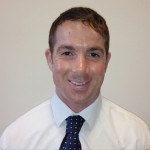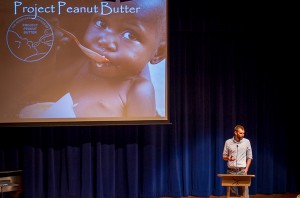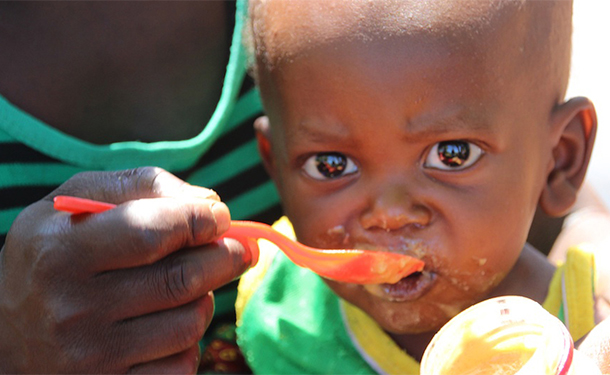Alumnus Thaddeus May returns to campus Monday, Nov. 23, to present a Suter Science Seminar about research on childhood nutrition and an especially lethal variant of protein energy malnutrition called kwashiorkor. The event will be at 4 p.m. in Suter Science Center 106.
May will speak in reference to research conducted with Project Peanut Butter in Malawi, an organization that works to solve the widespread issue of childhood nutrition in Africa with locally-made peanut-based Ready to Use Therapeutic Foods (RUTFs).

Before attending EMU, May worked with Mennonite Central Committee at a therapeutic feeding center in rural Mozambique. After graduating in 2002, he earned his medical degree at University of Kansas School of Medicine in 2007. This first exposure to childhood malnutrition, along with subsequent experiences in Angola, Malawi, and South Africa, continues to shape his career path, which has included specialized training in pediatric gastroenterology, hepatology and nutrition.
“From the perspective of a biomedicine program that advocates a holistic and global approach to healthcare and healing, we are very pleased to co-sponsor Dr. May’s presentation and look forward to the insights that he will share with our students,” said Dr. Roman Miller, director of EMU’s master’s in biomedicine program.
May is the second visitor to campus this fall to speak about Project Peanut Butter. This fall, Martin Histand ’05 received the Outstanding Young Alum of the Year award for his work overseeing the construction of RUTF-producing factories in Africa.

Pediatrician Mark Manary founded Project Peanut Butter in 2004 after working for years in sub-Saharan Africa without seeing results from milk-based formulas. After a 10-week study in Malawi studying the culture and daily life, he was learned that the best food “didn’t spoil, didn’t need to be cooked, was easy for mothers to give in small amounts to their children at home, and was energy dense,” according to the organization’s website. PPB and RUTFs have made substantial and successful impacts on childhood malnutrition.
Manary currently serves as the Helene Roberson Professor of Pediatrics at Washington University School of Medicine in St. Louis, Missouri.
The Suter Science Seminars—which are free and open to the public– cover a range of topics, from medicine and health care to conservation, biology, the philosophy of science and the intersection of faith and science. Most begin with refreshments and opportunities to meet the presenters. Included as part of the lecture series are two research symposia for undergraduate students in the STEM programs, including a spring poster session.
Suter Science Seminar presentations are made possible by the sponsorship of the Daniel B. Suter Endowment in Biology and the co-sponsorship of supporting programs.
